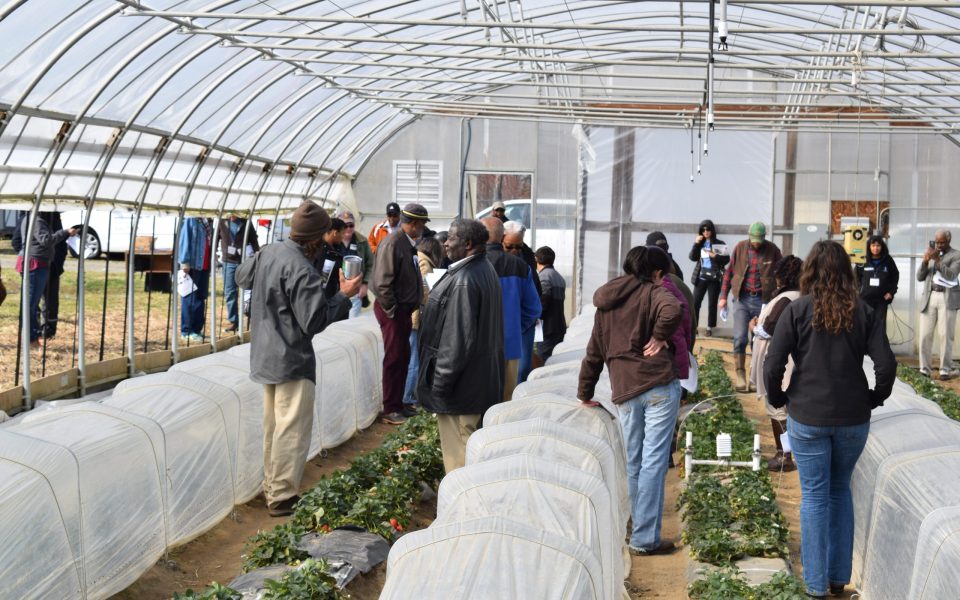Through an obscured sky, the early spring sun hung high as two dozen or so predominantly black farmers gathered around the strawberries Sanjun Gu, his colleagues and graduate students tend to on Tuesday afternoon, a day of learning that ended on fertile soil, just the way they like it.
NC A&T State University hosted its 32nd Small Farms Week beginning on Monday, an annual program sponsored by the Cooperative Extension that provides educational programs devised to promote sustainability and foster the economic viability of small-scale agriculture.
Small farmers from across North Carolina learn contemporary best practices through farm tours, workshops, hands-on activities and farming demonstrations. The week also presents students with opportunities to talk about their education and discuss their farming futures.
“I came to meet other farmers because I’m interested in learning more about the marketing and how I can sell [differently],” Alice W. Wilson of Duplin County said.
S. Janine Parker led a marketing strategy session Tuesday afternoon. Parker, who joined the Extension last July, earned her undergraduate and graduate degrees at A&T before working alongside coffee farmers in Guatemala with the Peace Corps.
“I fell in love with making sure small farmers get what they actually need… and making sure they are sustainable,” Parker said. “What I saw I realized could be applied at home because our small farms are continuously left behind.”
According to Parker, small farmers perform about 80 percent of farm labor in North Carolina. Almost 20 percent are black, and racial minorities comprise 25 percent overall. The state’s average age for farmers is 59, lower than the average for minority farmers.
“There are many who are aging out and we don’t have enough who are coming in to fill that gap,” Parker said. “More than any other segment, our minority farmers are losing their land in the process because they don’t have anybody to take [the farm] over and don’t know what to do. The land gets taken by the state.”
“There is a history of discrimination against minority farmers, too,” Parker said. “There was a report from the USDA in the 1990s that outlined some of the discriminatory practices, and because most of our farmers are older, they remember some of these things and there’s a lot of distrust.”
Access to and working knowledge of computers and the internet in order to make flyers or develop email lists to communicate with buyers, let alone traverse the world of social media, is the most significant to older farmers according to Parker.
“A lot of them don’t have any social platform at all so to ask them to go from, ‘I’m just talking to you face-to-face’ to social media is a huge jump without anyone there to help them navigate it,” she said. “They’re locked out of their own future because they don’t have access to it.”
Widening access to resources — mainly knowledge — to combat inequity is a central theme of the week. Organizations like NC AgrAbility that offered hands-on training for adaptive equipment and ergonomic tools for farmers with disabilities. A&T offered free health screenings to farmers who tend to live far away from healthcare facilities.[pullquote]Click “Cooperative Extension” at ag.ncat.edu to learn more.[/pullquote]
Susan Perry Cole and Savannah Copeland of the NC Association of Community Development Corporations are concerned about access, too. They attended to learn more about the farming sector as they work with the university and the Association of Mexicans in North Carolina to form a small farmer training program for Latinx farmers.
“We live in Edgecombe County and it has a very poor health profile,” Cole said. “The development of a sustainable local food economy has been identified as a goal. What we have to understand, too, is we all benefit [from these workers] cause they’re subsidizing our farm economy because of the wages… it’s not a living wage. We feel that the history of this institution, coming out of a segregated past, is the right kind of institution to take on this new challenge.”
The agricultural landscape is changing rapidly as technology advances and laws change. Legal and marketplace restrictions on antibiotic use that require North Carolina livestock farmers to acquire prescriptions from a veterinarian. Andrea Gentry, DVM outlined best practices for pasture and herd health with emphasis on healthcare prevention and biosecurity methods like quarantining new animals.
In a development more cultural than scientific, farmers of all ages are now considering hemp — a non-psychoactive variety of Cannabis sativa L. — as a favorable rotation crop that detoxifies soil, prevents erosion and requires little water to thrive. A license to grow is required in North Carolina, but the seeds, stalks and fibers can be utilized in products from nutraceuticals, clothing, construction materials, paper and biofuel.
“A lot of youth think farming is just sows, plows and cows,” Parker said. “What I try to explain is that farming is a variety of things; you don’t have to be a hog farmer or a corn farmer. People are farming fields of flowers and some folks are solar farmers now. There are people who’ve worked with conservation programs to save our land and they’re getting paid.”
Join the First Amendment Society, a membership that goes directly to funding TCB‘s newsroom.
We believe that reporting can save the world.
The TCB First Amendment Society recognizes the vital role of a free, unfettered press with a bundling of local experiences designed to build community, and unique engagements with our newsroom that will help you understand, and shape, local journalism’s critical role in uplifting the people in our cities.
All revenue goes directly into the newsroom as reporters’ salaries and freelance commissions.


Leave a Reply